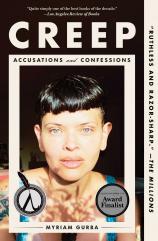Creep: Accusations and Confessions
Review
Creep: Accusations and Confessions
The subtitle of CREEP, “Accusations and Confessions,” provides a surprising amount of information on what Myriam Gurba’s outstanding essay collection holds. Yes, creeps (and that is letting them off lightly) abound here. But it is the accusations and confessions that connect these pieces, and both contain and unleash Gurba’s sharp wit, keen observations, literary stylings and wrath. And, really, these creeps had it coming.
From denouncing racists to calling out rapists, from putting colonizers on notice to lambasting those who wield their power with harm and hate, Gurba doesn’t hold back here. CREEP is also a tender and beautiful ode to her Mexican and Mexican-American heritage, the powerful men and women in her family, and how this identity is a strength and a source of art inextricable from who they are in the world.
"Gurba is a force to be reckoned with, and CREEP is mighty powerful --- a terrifying, even humorous, masterful ode to place and self."
The first piece, “Tell,” expresses and unpacks many of the themes found throughout the book. It examines violence against women and how it is often dismissed or even mythologized. Gurba interweaves the story of Joan Vollmer, who was shot to death by her husband, writer William S. Burroughs, with that of Gurba’s first boyfriend and the violence he perpetuated, and a trip to Mexico for her grandmother’s funeral. Mexican writer Juan Rulfo makes the first of many appearances in this essay. Also profiled is Jennifer Levin, who was murdered in 1986 by the “Preppy Killer,” Robert Chambers. Here, Gurba stands at the intersection of identities: personal, cultural, national, sexual, professional and artistic. “Cucuy” investigates these concepts and realities as well. Gurba’s fantastic prose takes us from the monstrous legends of El Cucuy and La Llorona to the real-life monster of Richard Ramirez.
In “Locas,” Gurba brings us even closer to her with the story of her cousin. Desiree’s rap sheet doesn’t even scratch the surface of her life experiences or reflect her worth and value. “The White Onion” peels back layers of white fragility, ethnic identity, and the struggles and challenges of Mexican and Mexican-American agricultural laborers in California, using Joan Didion as a narrative anchor, inspiration and cautionary figure. The shortest piece, “Pendeja, You Ain’t Steinbeck: My Bronca with Fake-Ass Social Justice Literature,” does much of the same work. Both “Slimed” and the titular “Creep” are intense explorations of sexual and domestic violence. Gurba is fearless and unrelenting, sharing her own stories and threading them with history, literature and cultural criticism.
Gurba lets California be a main character in CREEP. It shimmers and falters like its citizens, standing in for all of the failings and possibilities of the United States and for those particular American spaces where history is not really in the past and what was originally here is vibrant and beautiful, refusing to be ignored.
Each piece is layered and rich. Gurba skillfully captures how all the concerns she examines here intersect. It will challenge readers in all the right ways to reconsider assumptions and biases, to scrutinize American systems and structures, and to rethink how vulnerability, power, pride and dread are expressed and analyzed. Gurba is a force to be reckoned with, and CREEP is mighty powerful --- a terrifying, even humorous, masterful ode to place and self.
Reviewed by Sarah Rachel Egelman on September 9, 2023
Creep: Accusations and Confessions
- Publication Date: September 3, 2024
- Genres: Essays, Nonfiction, Sociology
- Paperback: 368 pages
- Publisher: Avid Reader Press/Simon & Schuster
- ISBN-10: 1982186488
- ISBN-13: 9781982186487




